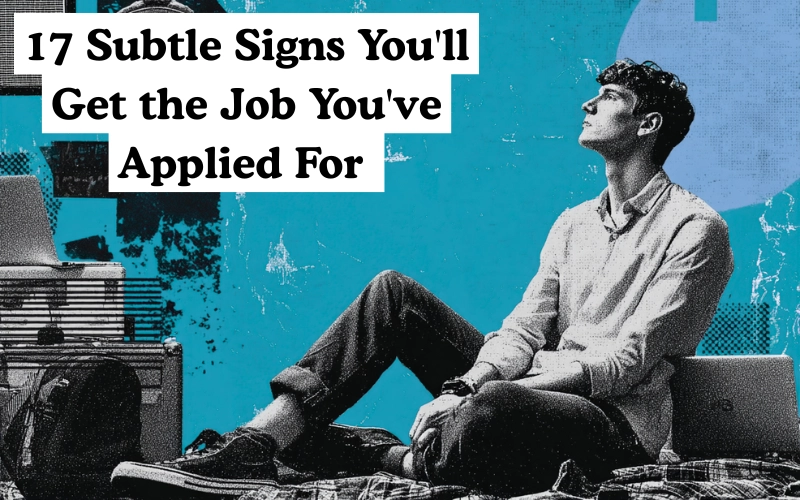You just walked out of an interview feeling… something.
Maybe the hiring manager smiled more than expected. Maybe they asked about your start date. Or maybe the whole thing ran 20 minutes over schedule.
These moments mean something.
After analyzing hundreds of successful interviews, we’ve identified 17 signals that separate offers from rejections. Some are obvious. Most fly right under the radar.
The difference between landing your dream role and getting ghosted often comes down to recognizing these subtle cues in real-time.
Smart candidates know how to read the room — and adjust their approach accordingly.
During the Interview
The real indicators of interview success happen in the moment. While you’re answering behavioral questions and discussing your experience, hiring managers drop clues about their level of interest.
These signals range from subtle language shifts to obvious actions like extending the conversation beyond the scheduled time. Paying attention to these cues helps you gauge your performance and adjust your approach mid-interview.
1. The Interviewer Uses Inclusive Language
Interviewers who see you as a potential hire naturally shift their language. They’ll say “your desk would be here” or “you’ll work closely with Michael from marketing.” This inclusive phrasing means they’re already picturing you in the role.
Generic language like “the person in this position” or “whoever we hire” signals distance. When recruiters start using “we” and “our team” while discussing projects, they’re mentally including you in future plans.
2. You Notice Positive Body Language Cues
Body language reveals what words often hide. Engaged interviewers lean forward, maintain eye contact, and nod while you speak. They put their phones away and close their laptops. Their arms stay uncrossed, and they mirror your gestures unconsciously.
Watch for genuine smiles—the kind that create crow’s feet around the eyes. These non-verbal signals indicate genuine interest in your candidacy and create a connection beyond professional courtesy.
3. The Conversation Runs Longer Than Scheduled
Time equals interest in the interview world. When a 30-minute screening call stretches to 45 minutes, or an hour-long panel becomes 90 minutes, you’ve captured their attention. Busy hiring managers guard their schedules carefully.
They’ll cut unsuccessful interviews short to reclaim their time. Extended conversations mean they want to learn more about you, explore your fit thoroughly, and often, they’re already selling you on the opportunity.
4. The Interview Feels More Like a Friendly Chat
Professional interviews that evolve into natural conversations signal strong rapport. The hiring manager shares personal anecdotes, asks about your hobbies, or discusses shared interests. Questions flow organically rather than following a rigid script.
You both laugh at appropriate moments. This conversational style indicates they’ve moved past evaluating your qualifications—they’re now assessing cultural fit and imagining you as a colleague. The formal barriers dissolve when genuine connection forms.
5. You’re Introduced to More Team Members
Meeting additional team members during your interview signals serious consideration. Hiring managers protect their team’s time and only introduce strong candidates to colleagues. These impromptu introductions—”Let me grab Tom from engineering” or “Ronna’s free, want to meet her?”—mean they’re gathering second opinions from people you’d work with directly.
Each introduction represents an investment in evaluating your fit. Multiple stakeholder meetings indicate you’ve passed initial screening hurdles.
6. You’re Given a Tour of the Workplace
Office tours go beyond basic hospitality. When interviewers show you around the workspace, kitchen, meeting rooms, and point out where you’d sit, they’re helping you visualize yourself there. They’ll highlight perks like the coffee machine, quiet zones, or collaborative spaces.
This physical orientation means they want you to feel comfortable and excited about the environment. Virtual candidates who receive detailed virtual tours or office photos experience the same positive signal.
7. The Interviewer Talks About Growth Opportunities
Discussions about career progression, promotion paths, and professional development indicate long-term thinking. Interviewers who outline training programs, mentorship opportunities, or potential career trajectories see you staying with the company.
They’ll mention previous employees who advanced, upcoming projects that could expand your skills, or leadership development programs. This forward-looking conversation means they’re investing mental energy in your future contribution, not just filling an immediate need.
8. The Hiring Manager Talks About Challenges You’ll Face
Transparency about role challenges demonstrates trust and genuine interest. Managers who discuss difficult clients, tight deadlines, or complex projects want to ensure you understand reality. This honesty serves two purposes: setting accurate expectations and gauging your problem-solving approach.
They’re essentially saying, “We want you to succeed, so let’s discuss the tough parts now.” Superficial interviews that only highlight positives often indicate less serious consideration.
9. They Share Insider Details About the Role
Confidential information sharing signals you’re moving into the inner circle. Hiring managers might discuss upcoming reorganizations, new product launches, or strategic shifts that impact the position. They’ll explain team dynamics, personality quirks of colleagues, or unwritten cultural norms.
These insider details go beyond the job description—they’re preparing you for success by sharing context usually reserved for employees. This transparency indicates they’re mentally onboarding you already.
10. The Interviewer Sells You on the Company
When interviewers shift from evaluating to selling, you’ve impressed them. They’ll emphasize benefits, flexibility, company culture, and unique perks unprompted. They might compare their company favorably to competitors or highlight recent wins and recognition.
This sales pitch intensifies if they sense you’re interviewing elsewhere. Strong candidates trigger competitive instincts—hiring managers want to ensure their offer stands out. The harder they sell, the more they want you.
11. They Mention “When” Instead of “If”
Language precision matters in interviews. “When you start” carries different weight than “if you join us.” Interviewers using definitive language—”when,” “will,” and “your”—have mentally moved past the evaluation phase.
They’ll say “when you meet the CEO” or “you’ll find our process interesting.” This linguistic shift happens unconsciously when interviewers feel confident about extending an offer. Conditional language like “would” and “could” suggests ongoing evaluation.
12. You’re Asked About Long-Term Career Goals
Questions about your five-year plan or career aspirations indicate investment thinking. Employers exploring your long-term goals want to ensure mutual benefit—they’re checking if your ambitions align with available opportunities.
They’ll probe about your ideal role progression, skills you want to develop, or industries that interest you. This conversation helps them position the role as a stepping stone toward your goals, making their offer more compelling.
13. You’re Asked About Salary Expectations Naturally
Compensation discussions that flow naturally into the conversation signal serious interest. Rather than awkward, rushed salary questions at the end, engaged interviewers weave this topic throughout. They’ll explore your current compensation, desired range, and non-monetary priorities.
They might share the role’s budget or discuss total compensation packages. This transparent dialogue means they’re already working to meet your expectations and avoid offer-stage surprises.
Wrapping Up the Interview
The final moments of your interview reveal crucial information about your standing. How the interviewer closes the conversation, what commitments they make, and the specific details they share all indicate their level of interest. These closing signals often prove more reliable than mid-interview cues because they represent the interviewer’s final impression after evaluating your complete performance.
14. They Ask About Your Availability to Start
Start date discussions signal serious intent. Interviewers who probe about notice periods, relocation timelines, or immediate availability are planning around your schedule. They’ll ask specific questions: “Could you start before month-end?” or “We need someone by June 15th—does that work?”
This practical planning means they’re moving from evaluation to logistics. Generic questions about availability feel different from targeted date negotiations that align with real business needs.
15. The Interviewer Explains the Next Steps Clearly
Specific timelines and detailed next steps indicate genuine interest. Strong candidates receive concrete information: “We’ll complete first rounds by Friday, then schedule second interviews next week.” Vague promises like “we’ll be in touch” often precede rejection emails.
Engaged hiring managers provide names of future interviewers, explain the decision process, and set expectations for response times. They might even schedule your next interview before you leave. Clear communication reflects their desire to keep you engaged throughout the hiring process.
16. You’re Invited to Meet Senior Leaders
Executive involvement signals you’re a top candidate. When hiring managers arrange meetings with directors, VPs, or C-suite executives, they’re investing political capital in your candidacy. Senior leader time is precious—they only meet candidates who’ve essentially passed lower-level screening.
These meetings might happen immediately (“Our CEO is free now”) or get scheduled quickly. The higher up the organizational chart you go, the more seriously they’re considering you for the role.
After the Interview
17. Follow-Up Communication Is Quick and Warm
Response time and tone reveal everything. Interested employers move fast—you’ll hear back within 24-48 hours with enthusiastic messages. The recruiter’s email includes personal references to your conversation, specific points that impressed them, and clear next steps.
They’ll respond promptly to your thank-you note with more than a standard acknowledgment. Radio silence or delayed, generic responses typically mean they’re pursuing other candidates. Warm, quick communication keeps momentum going because they don’t want to lose you to competing offers.
What to do next?
Take Action Based on the Signals You Observed
Reading positive signals means nothing without strategic follow-through. Strong indicators demand immediate action to maintain momentum and reinforce the interviewer’s positive impression. Send your thank-you email within 24 hours, referencing specific conversation points that excited you.
Connect with team members you met on LinkedIn with personalized messages. Research the growth opportunities and challenges they mentioned to prepare intelligent follow-up questions. If they discussed specific projects or initiatives, dig deeper into those areas and prepare relevant ideas to share in future rounds.
Your response should match their enthusiasm level—engaged interviewers deserve engaged candidates who demonstrate genuine interest through concrete actions.
Adjust Your Strategy When Signals Are Mixed
Mixed signals require careful navigation and strategic decision-making. Some interviews feature positive elements like extended conversation time but lack concrete next steps or inclusive language. This combination often means you’re a strong candidate among several contenders.
Double down on differentiation in your follow-up communications. Share additional work samples that address specific challenges they mentioned. Send a brief email outlining how you’d approach their biggest pain point.
Continue interviewing elsewhere while maintaining professional enthusiasm for this opportunity. Mixed signals rarely convert without extra effort, but targeted follow-up can tip the scales in your favor.
Maintain Momentum While Managing Expectations
Positive interview signals create excitement, but smart candidates balance optimism with pragmatism. Keep your job search active until you receive and accept a written offer. Schedule other interviews, maintain your networking efforts, and continue refining your interview skills.
Document the specific signals you noticed for future reference—this awareness sharpens your ability to read subsequent interviews accurately.
If you receive strong buying signals from multiple companies, leverage this position to expedite decision timelines. Email recruiters about competing timelines to accelerate their process.
Just remember, positive signals indicate probability, not certainty, so protect yourself by maintaining multiple job options.
After years of freelancing through broken systems and vague job boards, Josie built Remployee to help others find what she couldn’t at first: flexible work that feels like freedom, not chaos. She believes real jobs should fit real lives—and that thoughtful writing can be a bridge to better work. If you’re looking for permission to choose differently, Josie’s already given it.



